Low Carb Diet: What It Is & Meal Plan To Improve Your Health In 2024
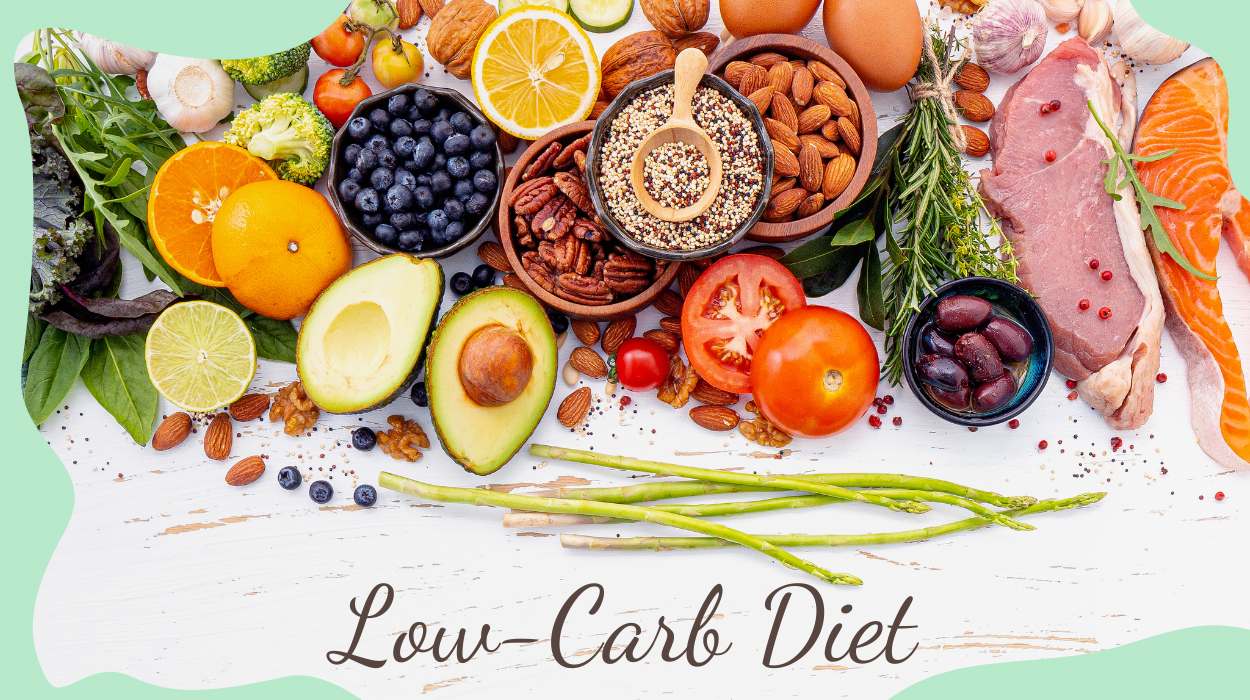
Are you looking to enhance and achieve optimal health? Low-carb and ketogenic diets might be your answer.
By reducing carbohydrate intake and incorporating a variety of low-carb foods to eat, you can experience a range of health benefits. They may include weight loss, improved blood sugar control, and a reduced risk of heart disease.
In this article, we’ll dive into what a low-carb diet is and how it can positively impact your well-being. Read on to learn how to start a low-carb diet today.
Key Takeaways
- Health benefits of low-carb diets include weight loss, improved blood sugar control, and cardiovascular health.
- The basics of a low-carb diet are protein-rich foods, healthy fats, non-starchy vegetables, and low-sugar fruits.
- Avoid refined grains, sugary foods, starchy vegetables, processed foods, and high-carb beverages.
- Temporary side effects, such as the keto flu, constipation, and reduced exercise performance, may occur during the adaptation phase.
- Proper hydration, fiber intake, and supplements can help alleviate some side effects.
- Individual experiences may vary, so consulting a dietitian is recommended for personalized guidance and support.
Low-Carb Diet Basics
A low-carbohydrate diet emphasizes limiting carbohydrates while increasing protein and healthy fat intake.
By restricting your daily carb intake, the body transitions from burning glucose for fuel into ketosis.[1] This is where the body is forced to burn ketones – derived from your fat stores – for energy. This keto diet metabolic shift can lead to weight loss,[2] improved diabetes management,[3] and other health benefits, such as better brain health.[4]
The basics of a low-carb diet include
- Low-carb veggies and fruits.
- Healthy fatty foods.
- High-quality protein foods, like lean meats and particular dairy products.
- No processed foods.
- No high-carb foods.
- No added sugar foods and drinks.
- Plenty of water.
Who Would Benefit From A Low Carb Diet?
Low-carbohydrate diets can help some people improve their health. If you are in the following groups, you may benefit from a low-carb diet:
- If you want to lose weight: Low-carb diets support weight loss[5] by naturally reducing calorie intake and controlling hunger.[6]
- If you have diabetes or insulin resistance: Limiting carbohydrate intake helps regulate blood sugar levels,[7] making it beneficial for those managing diabetes or insulin resistance. Insulin is a hormone that signals the body to transport glucose from the blood to the muscle and fat cells. Insulin resistance[8] occurs when the body becomes less responsive to insulin’s effects. This results in elevated blood sugar levels and an increased risk of type 2 diabetes.
- If you have heart disease risk factors: Low-carb diets can help reduce risk factors associated with heart disease,[9] such as high blood pressure or high cholesterol levels.
- If you seek to improve mental clarity and focus: Some people report enhanced cognitive function[10] and increased mental clarity when following a low-carb diet. Research shows that a ketogenic diet has neuroprotective properties[4] and can even improve symptoms of depression.[11]
- If you live with metabolic syndrome: A low-carb diet can help manage metabolic syndrome[12] by addressing elevated blood sugar.
- If you want to reduce sugar cravings: Sugar and high-glycemic foods can trigger food addiction[13] and sugar cravings. High-glycemic means that the food rapidly raises blood sugar after eating. A low-carb diet can help reduce sugar cravings[14] and promote healthier food choices by reducing or minimizing sugary foods.
Health Benefits Of A Low-Carb Diet
Here are the low-carb diet benefits:
Weight Loss And Improved Body Composition
Low-carb diets are effective for losing weight and improving body composition short term. While in ketosis, your body burns fat as its primary fuel source. This leads to a significant reduction in body weight, body fat percentage, and waist circumference.
Studies show that low-carb diets are more effective for weight loss[15] than low-fat diets. Low carbohydrate content diets promote greater satiety, reduced hunger, and higher energy expenditure.[16]
Enhanced Blood Sugar Control and Diabetes Management
A low-carbohydrate diet reduces fasting insulin[17] and helps stabilize blood sugar[7] levels. When you limit your carbohydrate intake, your body experiences lower blood glucose levels and reduced insulin requirements. This leads to better glycemic control and may reduce reliance on medications.[18]
Improved Cardiovascular Health And Risk Factors
Following a very low-carbohydrate diet can improve weight loss and lower blood pressure and triglyceride levels, reducing your risk of heart disease and stroke.[19]
Low-carbohydrate diets often reduce inflammation markers, too, such as C-reactive protein.[20] This further supports cardiovascular health.
However, we still need more research on the long-term effects[9] of a low-carbohydrate diet in managing cardiovascular health.
Metabolic Syndrome Management
Metabolic syndrome is a cluster of conditions that includes abdominal obesity,[21] high blood pressure,[22] high blood sugar, and abnormal cholesterol levels.[9] Studies support that limiting carbs manages and improves these markers effectively.
Better Brain Function And Mental Health
Emerging research suggests that low-carbohydrate diets may positively affect brain function and mental health.[11]
Low-carbohydrate diets are even associated with decreased symptoms of Alzheimer’s disease[23] in some people.
Low-Carb Diet Foods List
Here are the low-carb foods included in most low-carb recipes or chef-made meal services:
Protein-Rich Foods

Lean meats like chicken, turkey, and fish provide high-quality protein without more carbs. Opt for grass-fed beef.
Eggs are also a healthy low-carb protein source. However, those with high cholesterol may want to limit their egg intake[24] — especially while on a high-fat diet.
Finally, tofu[25] is a low-carb, high-protein plant-based alternative for vegans and vegetarians.
Healthy Fats
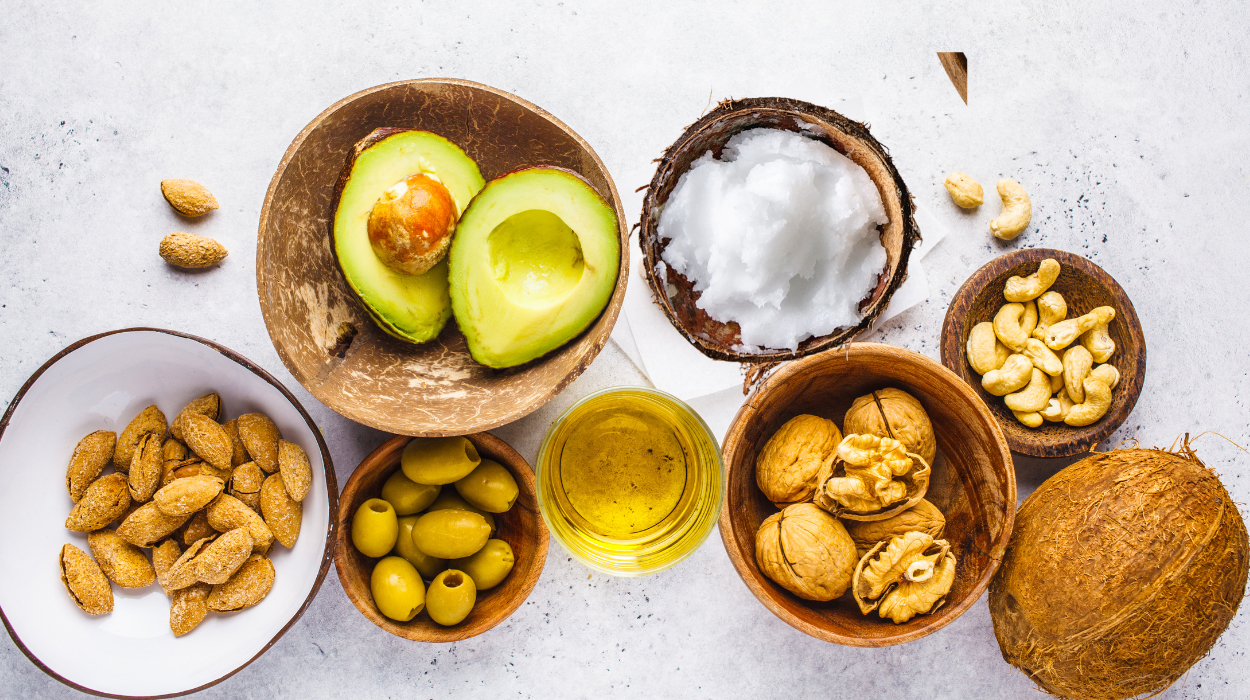
Incorporate sources of healthy fats, such as avocados, olive oil, or coconut oil. These provide essential nutrients and promote satiety.[26]
Non-Starchy Vegetables

Choose non-starchy vegetables that are low in carbs and high in fiber, vitamins, and minerals. Examples include low-carb greens superfoods like spinach, kale, broccoli, cauliflower, asparagus, zucchini, and bell peppers.
Berries And Low-Sugar Fruits
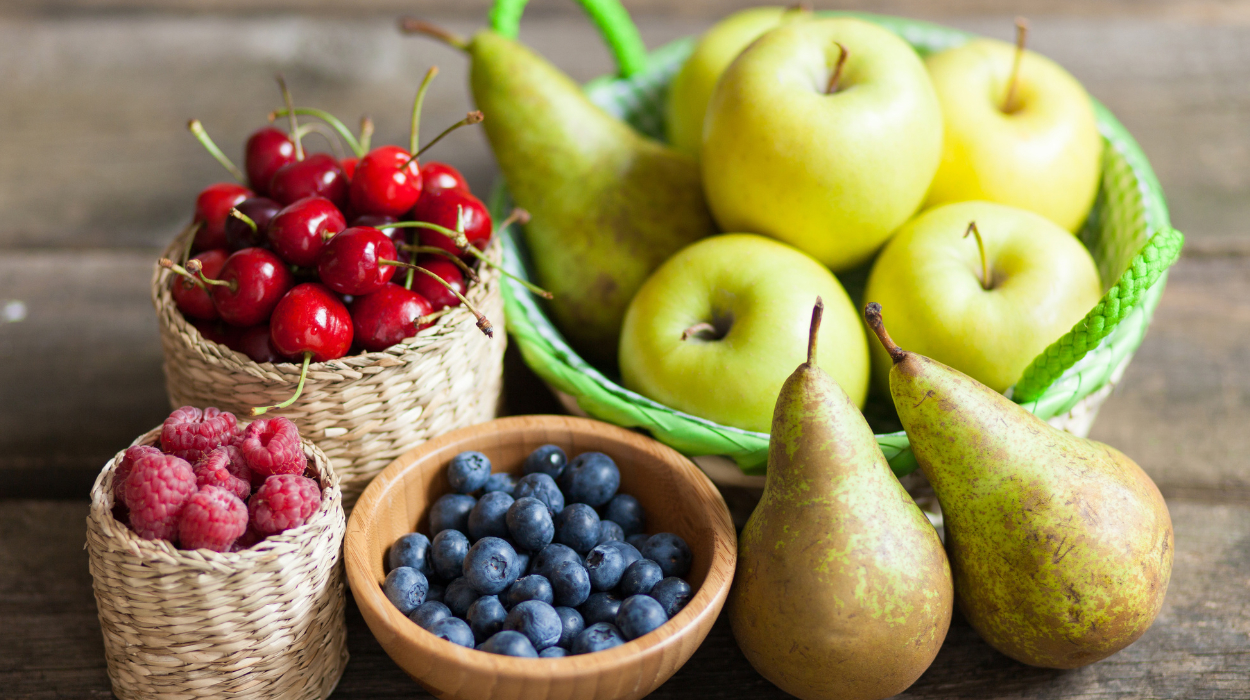
Enjoy berries like strawberries, blueberries, raspberries, and blackberries in moderation due to their lower sugar content. Also, opt for apples, pears, and peaches, fruits with relatively lower carbohydrate levels.
Dairy And Dairy Alternatives
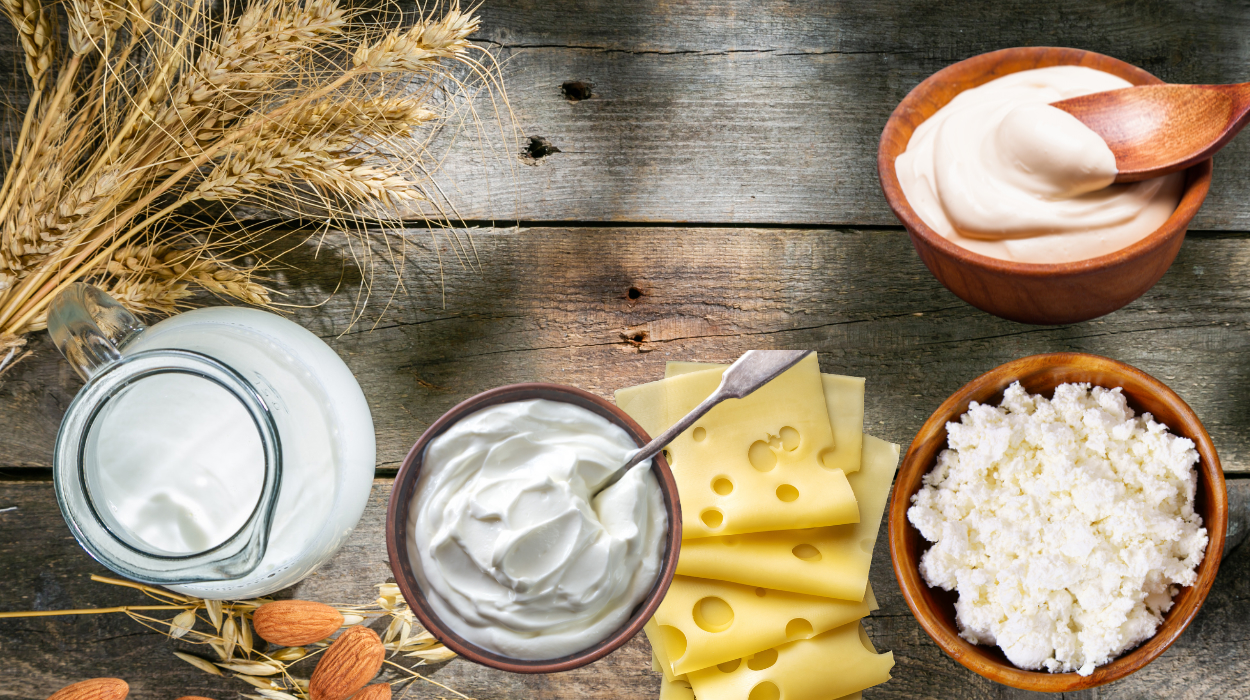
Select high-fat dairy products like Greek yogurt, sour cream, cottage cheese, and hard cheeses. These are typically low in carbs but high in protein and beneficial fats.
Alternatively, choose unsweetened almond milk or coconut milk as lower-carb plant-based alternatives.
Nuts And Seeds
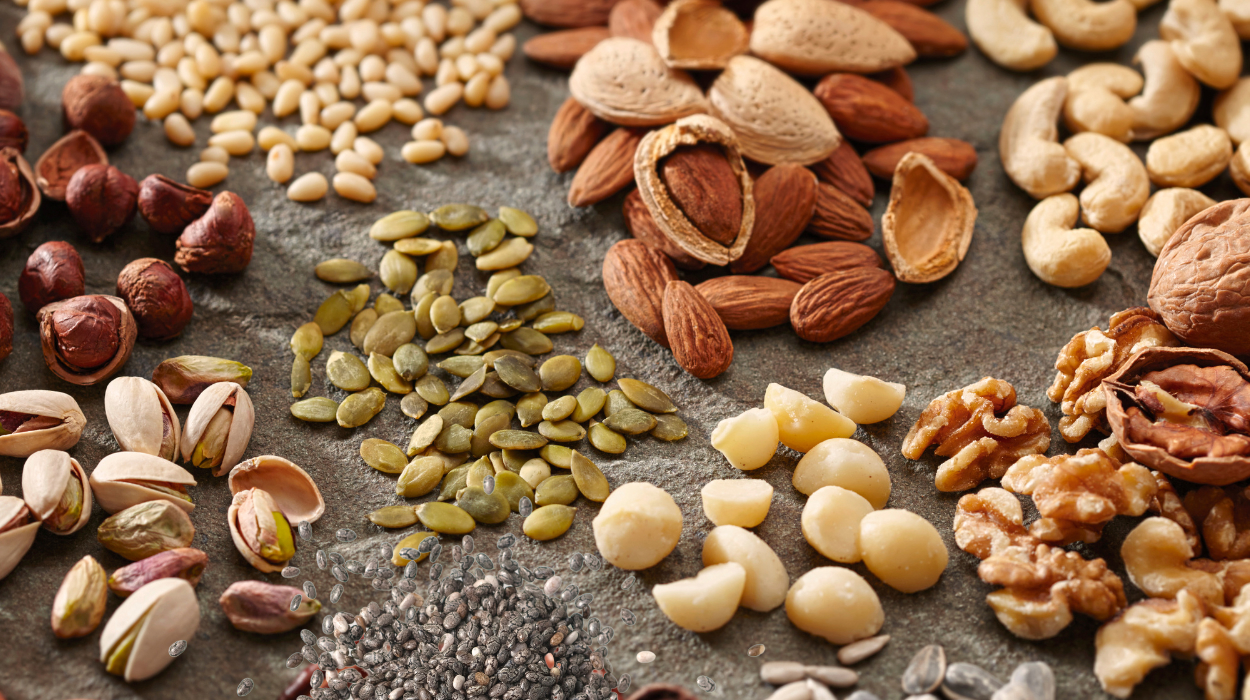
Include almonds, walnuts, chia seeds, flaxseeds, and pumpkin seeds. They are nutrient-dense, provide healthy fats,[27] and are relatively low in carbs.
Legumes And Beans In Moderation
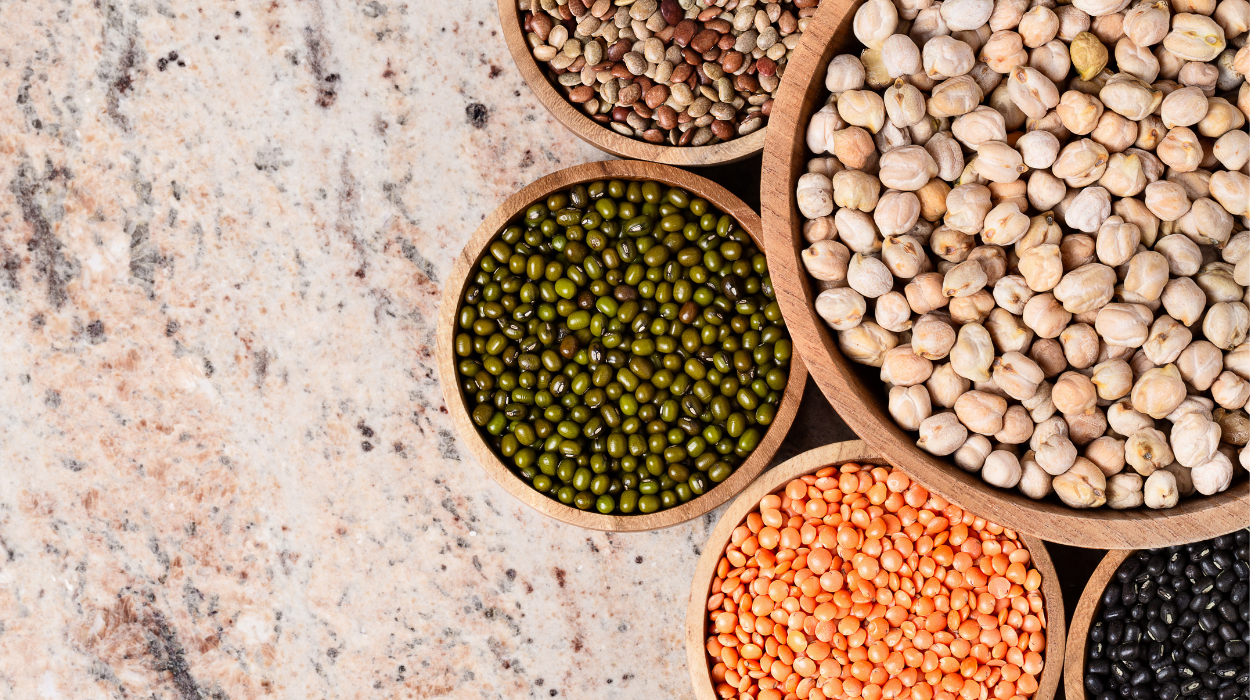
You can consume legumes like black beans, chickpeas, and lentils in moderation due to their higher carbohydrate content. However, they also provide fiber and protein.[28] Some low-starch legumes suitable for a low-carb diet include
- Green beans 1 cup, 5g net carbs.
- Snow peas 1 cup, 4g net carbs.
- Chickpeas 1/4 cup, 10g net carbs.
- Lentils 1/4 cup, 9g net carbs.
- Kidney beans 1/4 cup, 10g net carbs.
- Black soybeans 1/4 cup, 2g net carbs.
- Edamame 1/4 cup, 4g net carbs.
Herbs, Spices, And Condiments

Enhance the flavor of your low-carb meals with herbs, spices, and condiments like garlic, ginger, turmeric, mustard, vinegar, and low-sugar hot sauces.
Following a low-carb eating plan, you can make low-carb diet recipes and meal preps using the above typical foods. Or even order through selected low-carb meal delivery services.
Foods To Avoid On The Low-Carb Diet
On the flip side, here are the high carbohydrate rich-foods to avoid when you are low-carb dieting:
- High-Carb Starches: These are like sweet potatoes, whole grain pasta, bread, and wheat flour.
- Refined Grains and Grain Products: Low-carbohydrate diets limit refined grains like white bread, pasta, rice, and baked goods. Instead, eat whole-grain alternatives in moderation, such as quinoa or brown rice, and aim for 130 grams daily.[29] These provide complex carbs, which can help support gut health.[30] However, eating whole grains without exceeding your net carb limit may not be possible — especially if you’re on a low-carbohydrate diet like the ketogenic diet.
- Sugary Foods and Sweeteners: Avoid foods with added sugars like candy, soda, desserts, and cereals. Steer clear of artificial sweeteners.
- Starchy Vegetables: Limit starchy vegetables like potatoes, corn, and peas due to their higher carbohydrate content.
- Processed and Packaged Foods: Avoid processed and packaged foods as they often contain hidden sugars, unhealthy fats, and high-carb fillers. These include chips, crackers, sugary sauces, and pre-packaged meals.
- Higher-Carb Fruits: While fruits are generally healthy, consume certain high-sugar fruits like bananas, grapes, and tropical fruits in moderation.
- High-Carb Beverages: Minimize or avoid high-carb beverages such as regular soda, fruit juices, sweetened coffee drinks, and energy drinks. Opt for water, unsweetened tea, or sparkling water instead.
- Legumes and Beans: While legumes can provide fiber and protein, they can also be relatively high in carbs. Limit or avoid high-carb legumes like pinto beans or black beans if following very low-carb eating.
Potential Side Effects Of A Low-Carb Diet
Low-carb eating can trigger various side effects, especially during the initial adaptation phase. These side effects, although temporary, can be managed with proper care and adjustments. Some of the low-carb diet side effects are:
- Keto Flu: Some people may experience flu-like symptoms, including headaches, fatigue, nausea,[31] irritability, and brain fog. These usually subside after a few days.
- Constipation: Decreased fiber intake[32] from limiting carbohydrate sources like low-carb cereals can lead to some digestive issues.[33]
- Bad Breath: The production of ketones can result in temporary bad breath.[34]
- Nutrient Imbalances: A low-carb diet can cause nutrient deficiencies[32] if not managed correctly. Nutrients to monitor include fiber, calcium, magnesium, and B vitamins.
- High Cholesterol Levels: A ketogenic diet can trigger a rise in cholesterol[31] levels — especially if the diet is high in saturated fat.
- Kidney Stones: A ketogenic diet can also increase the risk of renal stones.[31]
The Bottom Line
There are many health benefits to gain from a low-carb diet plan. However, you should be aware of the potential side effects.
Understanding that these effects are part of the body’s adaptation process can help alleviate concerns. Plus, you can mitigate some side effects by staying hydrated and incorporating nutrient-rich foods.
Everyone’s experience may differ, and consulting a registered dietitian is helpful for diet planning — especially for ensuring optimal nutrient intake and knowing how many carbs to consume. With careful attention to your body’s needs, a low-carbohydrate diet can be valuable in achieving your health goals.
+ 34 sources
Health Canal avoids using tertiary references. We have strict sourcing guidelines and rely on peer-reviewed studies, academic researches from medical associations and institutions. To ensure the accuracy of articles in Health Canal, you can read more about the editorial process here
- O’Neill, B.J. and Raggi, P. (2020). The ketogenic diet: Pros and cons. [online] 292, pp.119–126. doi:https://doi.org/10.1016/j.atherosclerosis.2019.11.021.
- Ting, R., Dugré, N., G. Michael Allan and Lindblad, A.J. (2018). Ketogenic diet for weight loss. Canadian Family Physician, [online] 64(12), p.906. Available at: https://www.ncbi.nlm.nih.gov/pmc/articles/PMC6371871/
- Dashti, H., Mathew, T.C. and N.S. Al-Zaid (2020). Efficacy of Low-Carbohydrate Ketogenic Diet in the Treatment of Type 2 Diabetes. [online] 30(3), pp.223–235. doi:https://doi.org/10.1159/000512142.
- Sethi, S. and Ford, J.M. (2022). The Role of Ketogenic Metabolic Therapy on the Brain in Serious Mental Illness: A Review. [online] doi:https://doi.org/10.20900/jpbs.20220009.
- Goss, A.M., Gower, B.A., Soleymani, T., Stewart, M., Pendergrass, M., Lockhart, M.E., Krantz, O.M., Shima Dowla, Bush, N.C., Valene Garr Barry and Fontaine, K.R. (2020). Effects of weight loss during a very low carbohydrate diet on specific adipose tissue depots and insulin sensitivity in older adults with obesity: a randomized clinical trial. [online] 17(1). doi:https://doi.org/10.1186/s12986-020-00481-9.
- Landry, M.J., Crimarco, A. and Gardner, C.D. (2021). Benefits of Low Carbohydrate Diets: a Settled Question or Still Controversial? [online] 10(3), pp.409–422. doi:https://doi.org/10.1007/s13679-021-00451-z.
- Wheatley, S.D., Deakin, T., Arjomandkhah, N.C., Hollinrake, P.G. and Reeves, T.E. (2021). Low Carbohydrate Dietary Approaches for People With Type 2 Diabetes—A Narrative Review. [online] 8. doi:https://doi.org/10.3389/fnut.2021.687658.
- Lee, S.-H., Park, S.-Y. and Cheol Ung Choi (2021). Insulin Resistance: From Mechanisms to Therapeutic Strategies. [online] 46(1), pp.15–37. doi:https://doi.org/10.4093/dmj.2021.0280.
- dong, tingting, Guo, M., Zhang, P., Sun, G. and Chen, B. (2020). The effects of low-carbohydrate diets on cardiovascular risk factors: A meta-analysis. [online] 15(1), pp.e0225348–e0225348. doi:https://doi.org/10.1371/journal.pone.0225348.
- Mansour Altayyar, Nasser, J.A., Dimitra Kristina Thomopoulos and Bruneau, M. (2022). The Implication of Physiological Ketosis on The Cognitive Brain: A Narrative Review. [online] 14(3), pp.513–513. doi:https://doi.org/10.3390/nu14030513.
- Danan, A., Westman, E., Saslow, L.R. and Ede, G. (2022). The Ketogenic Diet for Refractory Mental Illness: A Retrospective Analysis of 31 Inpatients. [online] 13. doi:https://doi.org/10.3389/fpsyt.2022.951376.
- Foley, P. (2021). Effect of low carbohydrate diets on insulin resistance and the metabolic syndrome. [online] 28(5), pp.463–468. doi:https://doi.org/10.1097/med.0000000000000659.
- Lennerz, B. and Lennerz, J.K. (2018). Food Addiction, High-Glycemic-Index Carbohydrates, and Obesity. [online] 64(1), pp.64–71. doi:https://doi.org/10.1373/clinchem.2017.273532.
- Unwin, J., Delon, C., Giæver, H., Kennedy, C., Painschab, M., Sandin, F., Charlotte Schön Poulsen and Wiss, D.A. (2022). Low carbohydrate and psychoeducational programs show promise for the treatment of ultra-processed food addiction. [online] 13. doi:https://doi.org/10.3389/fpsyt.2022.1005523.
- Chawla, S., Silva, F., Medeiros, S.A., Mekary, R.A. and Radenkovic, D. (2020). The Effect of Low-Fat and Low-Carbohydrate Diets on Weight Loss and Lipid Levels: A Systematic Review and Meta-Analysis. [online] 12(12), pp.3774–3774. doi:https://doi.org/10.3390/nu12123774.
- Ebbeling, C.B., Feldman, H.A., Klein, G.L., Wong, J.M.W., Bielak, L., Steltz, S.K., Luoto, P.K., Wolfe, R.R., Wong, W. and Ludwig, D.S. (2018). Effects of a low carbohydrate diet on energy expenditure during weight loss maintenance: randomized trial. [online] pp.k4583–k4583. doi:https://doi.org/10.1136/bmj.k4583.
- Apekey, T.A., Maynard, M.J., Monia Kittana and Kunutsor, S.K. (2022). Comparison of the Effectiveness of Low Carbohydrate Versus Low Fat Diets, in Type 2 Diabetes: Systematic Review and Meta-Analysis of Randomized Controlled Trials. [online] 14(20), pp.4391–4391. doi:https://doi.org/10.3390/nu14204391.
- Han, Y., Cheng, B., Guo, Y., Wang, Q., Yang, N. and Lin, P. (2021). A Low-Carbohydrate Diet Realizes Medication Withdrawal: A Possible Opportunity for Effective Glycemic Control. [online] 12. doi:https://doi.org/10.3389/fendo.2021.779636.
- Li, W., Zhang, J., Xu, D., Zhou, Y., Qu, Z., Yang, Q. and Qiujv Lv (2022). Low carbohydrate ketogenic diets reduce cardiovascular risk factor levels in obese or overweight patients with T2DM: A meta-analysis of randomized controlled trials. [online] 9. doi:https://doi.org/10.3389/fnut.2022.1092031.
- Ruth, M.R., Port, A., Shah, M., Bourland, A.C., Istfan, N.W., Nelson, K.P., Noyan Gokce and Apovian, C.M. (2013). Consuming a hypocaloric high fat low carbohydrate diet for 12 weeks lowers C-reactive protein, and raises serum adiponectin and high density lipoprotein-cholesterol in obese subjects. [online] 62(12), pp.1779–1787. doi:https://doi.org/10.1016/j.metabol.2013.07.006.
- Kong, Z., Sun, S., Shi, Q., Zhang, H., Tong, T.K.K. and Nie, J. (2020). Short-Term Ketogenic Diet Improves Abdominal Obesity in Overweight/Obese Chinese Young Females. [online] 11. doi:https://doi.org/10.3389/fphys.2020.00856.
- Unwin, D.M., Tobin, S., Murray, S.A., Delon, C. and Brady, A.P. (2019). Substantial and Sustained Improvements in Blood Pressure, Weight and Lipid Profiles from a Carbohydrate Restricted Diet: An Observational Study of Insulin Resistant Patients in Primary Care. [online] 16(15), pp.2680–2680. doi:https://doi.org/10.3390/ijerph16152680.
- Tabaie EA, Reddy AJ, Brahmbhatt H. (2021). A narrative review on the effects of a ketogenic diet on patients with Alzheimer’s disease. AIMS Public Health. [online] 2021;9(1):185-193. doi:10.3934/publichealth.2022014
- Li, M., Chen, J., Chen, C. and Yi No Kang (2020). Association between Egg Consumption and Cholesterol Concentration: A Systematic Review and Meta-Analysis of Randomized Controlled Trials. [online] 12(7), pp.1995–1995. doi:https://doi.org/10.3390/nu12071995.
- Usda.gov. (2023). FoodData Central. [online] Available at: https://fdc.nal.usda.gov/fdc-app.html#/food-details/174290/nutrients
- Zhu, L., Huang, Y., Indika Edirisinghe, Eun Young Park and Burton-Freeman, B. (2019). Using the Avocado to Test the Satiety Effects of a Fat-Fiber Combination in Place of Carbohydrate Energy in a Breakfast Meal in Overweight and Obese Men and Women: A Randomized Clinical Trial. [online] 11(5), pp.952–952. doi:https://doi.org/10.3390/nu11050952.
- Gonçalves, B., Pinto, T., Aires, A., Maria Cristina Morais, Bacelar, E., Anjos, R., J. Ferreira-Cardoso, Oliveira, I., Vilela, A. and Cosme, F. (2023). Composition of Nuts and Their Potential Health Benefits—An Overview. [online] 12(5), pp.942–942. doi:https://doi.org/10.3390/foods12050942.
- Singh, N., Jain, P., Megha Ujinwal and Sapna Langyan (2022). Escalate protein plates from legumes for sustainable human nutrition. [online] 9. doi:https://doi.org/10.3389/fnut.2022.977986.
- Oh (2023). Low Carbohydrate Diet. [online] Available at: https://pubmed.ncbi.nlm.nih.gov/30725769/
- Gentil, P., Mancin, L., Bianco, A., Thomas, E., João Felipe Mota and Piccini, F. (2019). Ketogenic Diet and Microbiota: Friends or Enemies? [online] 10(7), pp.534–534. doi:https://doi.org/10.3390/genes10070534.
- Dietch, D.M., Kerr-Gaffney, J., Hockey, M., Marx, W., Anu Ruusunen, Young, A.H., Berk, M. and Mondelli, V. (2023). Efficacy of low carbohydrate and ketogenic diets in treating mood and anxiety disorders: systematic review and implications for clinical practice. [online] 9(3). doi:https://doi.org/10.1192/bjo.2023.36.
- Neriya Levran, Levek, N., Sher, B., Gruber, N., Arnon Afek, Efrat Monsonego-Ornan and Orit Pinhas-Hamiel (2023). The Impact of a Low-Carbohydrate Diet on Micronutrient Intake and Status in Adolescents with Type 1 Diabetes. [online] 15(6), pp.1418–1418. doi:https://doi.org/10.3390/nu15061418.
- Makki, K., Deehan, E.C., Walter, J. and Fredrik Bäckhed (2018). The Impact of Dietary Fiber on Gut Microbiota in Host Health and Disease. [online] 23(6), pp.705–715. doi:https://doi.org/10.1016/j.chom.2018.05.012.
- Qiao, Y., Gao, Z.-H., Liu, Y., Cheng, Y., Yu, M., Zhao, L., Duan, Y. and Liu, Y. (2014). Breath Ketone Testing: A New Biomarker for Diagnosis and Therapeutic Monitoring of Diabetic Ketosis. [online] 2014, pp.1–5. doi:https://doi.org/10.1155/2014/869186.



